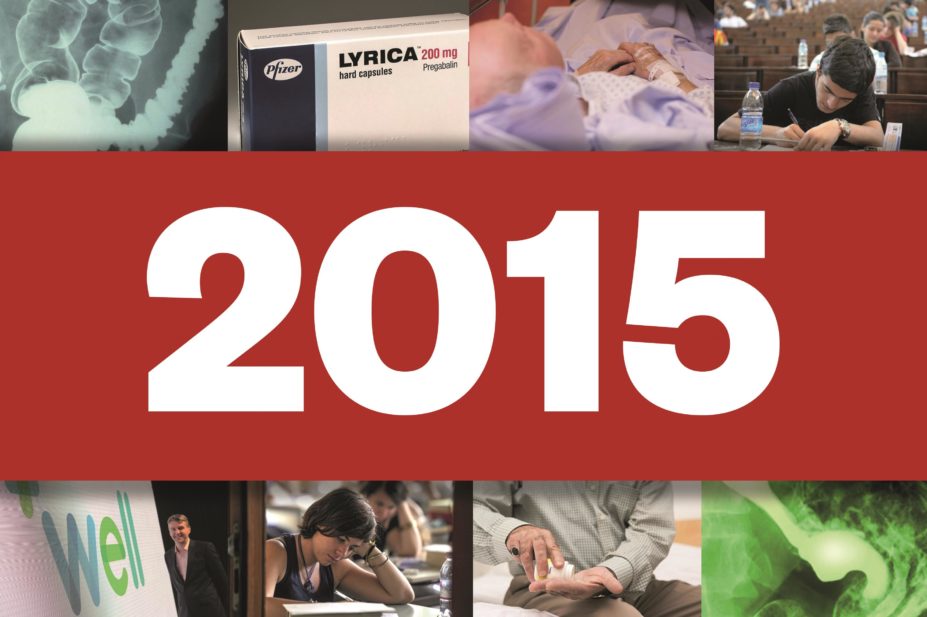
Drug safety was a hot topic in 2015, accounting for five of the top 10 news stories consumed by our readers. This is no surprise because pharmacists are the custodians of medicines and want the latest information about adverse drug reactions and pharmacovigilance to ensure the best care of their patients.
The reclassification of the non-steroidal anti-inflammatory drug diclofenac from a pharmacy (P) medicine to a prescription-only medicine (POM) because of an increased risk of cardiovascular side effects was the most read news story in 2015. Perhaps this raised questions as to whether the medicines regulator had confidence in pharmacists to manage appropriate short-term use of drugs over the counter.
Although proton pump inhibitors (PPI) have been linked with heart risks (our second most popular story), the UK regulator was confident enough to skip the P category altogether and allow one PPI, esomeprazole, to be sold as a general sales list (GSL) product in supermarkets. This proved to be our 9th most popular story, possibly because of the unusual nature of this drug classification.
Pharmacists were also keen to read stories that looked at the daily grind of their work, taking an interest in the patent case involving Pfizer’s Lyrica, issues affecting pre-registration trainees, the regulatory approval of new drugs, and what new UK pharmacy players like Well may do in the future.
Top 10 news stories read in 2015:
- Risk of heart problems prompts removal of OTC diclofenac from UK pharmacy shelves
Diclofenac is no longer available as a P medicine after regulators concluded that the small risk of cardiovascular side effects could not be ruled out even when it is taken for a short time or at a lower dose. - Proton pump inhibitors are associated with increased risk of heart attack
Patients with gastro-oesophageal reflux disease who took PPIs were more likely than the general population to suffer a heart attack. - Pfizer loses Lyrica patent infringement case
The pharmaceutical company lost its patent infringement case against generic drug firms Actavis and Mylan for the analgesic pregabalin (Lyrica). - Common antibiotic taken with a diuretic linked to sudden death
A study found that spironolactone, a diuretic used to treat heart failure, is linked with an increased risk of sudden death when combined with the antibiotic trimethoprim–sulfamethoxazole. - Pass rates for GPhC registration exam vary between universities
The University of Bath saw the highest pass rate (100%) for the General Pharmaceutical Council’s (GPhC) registration assessment in 2014, while the lowest score was seen at the University of Portsmouth, where 70% of students passed the assessment. - Paracetamol use linked with cardiovascular risk and other adverse events
Researchers find a consistent dose-response relationship between the commonly used analgesic paracetamol and risk of mortality or adverse events. - Pharmacy students demand changes to registration assessment
Pressure mounted on the General Pharmaceutical Council when students called for changes to the way future pharmacists are examined, after hundreds of trainees complained about the June 2015 registration assessment. - Bestway rebrands Co-operative pharmacies as ‘Well’ and reveals business plans
The new player in the UK pharmacy market plans to grow its revenues from £750m to £1bn by 2018, and bring in 220 more premises in the next three years. - Heartburn drug esomeprazole is first proton pump inhibitor to be sold outside pharmacies in the UK
Nexium Control (esomeprazole) becomes available in corner shops and supermarkets, following its reclassification to a general sales list (GSL) medicine. - FDA approves two new drugs for irritable bowel syndrome
The US regulator approved rifaximin, an antibiotic, and eluxadoline, an antagonist and agonist of the δ and µ opioid receptors, respectively, for patients with irritable bowel syndrome with diarrhoea.


